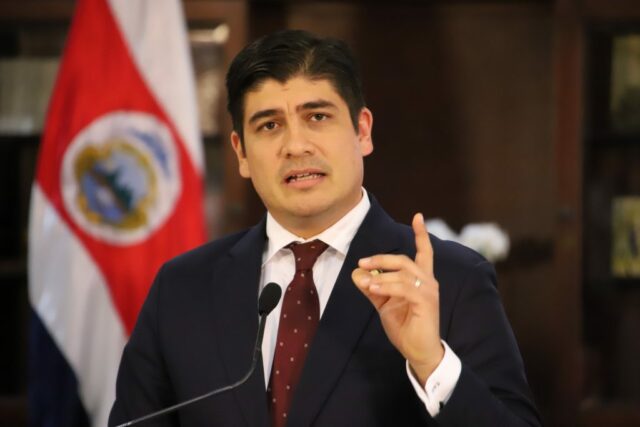
“I would ask the national community not be deceived by false narratives like that we are going to undercut institutions, sell institutions, fire people, hurt the country … rather all this struggle is to take care of the country, the Costa Rican Social Security Fund (CCSS), the Ministry of Public Education (MEP) “.
With that phrase, the President of the Republic, Carlos Alvarado Quesada, asked citizens to put aside the speeches stating that his administration will promote the privatization or closure of any public entity, as part of the negotiations that he will enter into with the International Monetary Fund (IMF).
During his speech at the end of a dialogue table held on December 5 at the “Finca 6” Archaeological Site in Osa, the President insisted on the need to generate fresh resources and lower spending, without giving details of how he plans to do it.
“I also have to speak honestly: we have to make an adjustment because otherwise the country will go bankrupt and we will suffer more. That is why we have come to the table again and we proposing rational ideas. The ministers know that it is time to tighten the belt and reduce spending, to propose things that we will take to the Legislative Assembly, none of the decisions can touch the poor people, it must be as fair as possible,” said the President.
At the same time, he reiterated his message that an agreement with the multilateral financial entity would prevent the economy from making a forced arrangement. “Imagine those who are producers, who have a certifier and generate a product. You receive the product at ¢ 500, but if you certify it, they receive it for ¢ 1,000. Do you prefer it to be certified or not? “The certifier may have an ugly name, maybe 40 years ago a lot of traps were pulled off in Latin America and elsewhere, but what it certifies and gives the most viable solution, it does,” said Alvarado Quesada.
Negotiations will be resumed
The President’s presentation comes two days after the Government of the Republic confirmed that it will resume negotiations with the International Monetary Fund, after it had to pause them two months ago, before the outbreak of protests that caused roadblocks between the 30th of September and October 15th, as well as violent clashes with the Public Force.
The National Executive pointed out through a statement that with the agreement it intends to achieve economic stability that allows to overcome the crisis faced with its debts and the implications that this would bring for indicators such as interest rates, the exchange rate or inflation.
For this, the Alvarado Quesada administration will also have to present a proposal to balance public finances which, according to the press release, will be negotiated with the fractions that make up the Legislative Assembly, in order to guarantee its political viability.
It was hinted that they will seek new taxes in a much more moderate way than it intended the previous time, when social, business and union sectors rejected a first proposal to the Fund, considering it unbalanced in that matter.
Now, the Government announced that it would seek only 0.8% of the gross domestic product (GDP) in new taxes (without saying which ones); that is, about ¢ 286,000 million. The remaining adjustment, as stated, would come from the agreements of the Multisectoral Dialogue Table, spending reductions in public spending, the application of the fiscal rule and a reduction in exemptions in the order 0.7% of production (about ¢ 251,000 million).
The communication from the Presidential House omitted negotiation dates, as well as more specific information on the process; however, it was explained that “he will be reporting in a transparent manner when the starting date for the negotiations is set and as relevant information emerges to be shared.” It also did not refer to whether it will support the request for an extended credit service to the IMF for $ 1.75 billion, for three years, as it did initially.
The President did indicate that the objective of the negotiations is to achieve a primary surplus of 1% in 2023, which “would allow consolidating a trajectory of medium and long-term stability in the country’s public finances,” according to the Executive.
The intention to continue with the negotiations had already been stated by the administration. In fact, when it paused to give way to a dialogue process, the Minister of Finance, Elian Villegas Valverde, told that the talks with the IMF would restart when it was “opportune” and “the country was ready.”
Legislative demands re-initiating talks
Reactivating the talks was also vital to maintain relations with the main opposition parties in the National Assembly, which asked the Government for a show of interest in solving the financial situation of the country before the end of its constitutional period in 2022.
The call was made mainly by deputies of the majority bench, the National Liberation Party (PLN), in which even the legislator Silvia Hernández Sánchez, also President of the Permanent Commission on Tax Matters, questioned the processing of low-cost international loans if an agenda of fiscal balance was not continued.
Strong fiscal deficit
Costa Rica must run to close its gap between income and expenses, which this year will end up above 9% of gross domestic product (further deteriorated by the novel Coronavirus Pandemic). This imbalance is made up of 4% of production by the basic operation of the State and the remaining figure is explained by the payment of interest, which continues to grow, given the need for internal and external debt resources that suffocates the State.
This imbalance already puts pressure on factors such as the exchange rate, and according to the hierarch of the Superintendency of Pensions (Supen) and the General Superintendency of Financial Entities (Sugef), Rocío Aguilar Montoya, they put the national financial system and its availability of resources, with the corresponding impact that this has on factors such as poverty or employment.

